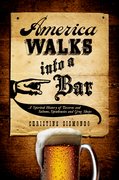My 9 favorite bars in America
By Christine Sismondo
1. Marie’s Crisis – 59 Grove St, West Village, Manhattan.
Located in the basement of the building that Thomas Paine died in, patrons keep liberty alive by singing show tunes around a piano bar `til all hours of the night at Marie’s. Not to put too fine a point on this, but this place is a dive. That said, it’s been named “best bar in the world” by everyone I’ve ever taken there.











